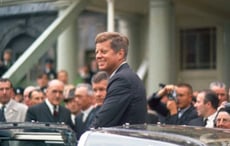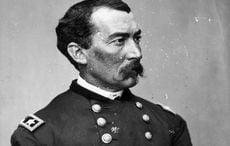| Photo in the aftermath of Easter Rising from the cover of "On Another Man's Wound" (Photo: Mercier) |
If there is a better book on the Easter Rising and its aftermath than Ernie O’Malley’s “On Another Man’s Wound,” I have yet to read it. It has just been reissued by Mercier Press in Ireland.
On this Easter Monday 2013, the 97th anniversary of that rising which changed Ireland forever, it is well worth buying.
O’Malley was the son of prosperous Dublin citizens, seemingly on his way to a middle class existence as he was studying to be a doctor, had a brother in the British Army, and was not considered the rebel type.
The Easter Rising quickly changed all that. As O’Malley watched his beloved Dublin get torn apart and the brave but utterly outnumbered Republican revolutionaries quickly get surrounded by far superior numbers and military might, something stirred in him.
With a friend he procured a gun and began a small diversionary tactic of firing at the British positions at night. Though the action lasted only a brief period, it changed O’Malley forever.
O’Malley has a unique descriptive style. Most men of war do not have the poetic touch that O’Malley enjoyed. The book is a joy to read for its closely observed scenes of Dublin life during the Rising and even more so for his portrayal of rural Ireland after the Rising when the entire country seemed to suddenly find itself supporting the rebels.
By then O’Malley was a key officer in the newly formed Irish Republican Army and he got to know and write insightfully about Michael Collins, De Valera and many others.
There is a never to be forgotten scene late in the book when O’Malley , De Valera and Collins, as well as another military leader Liam Lynch, meet in a secret location to discuss the handling of the War of Independence.
De Valera, just back from America, clearly knew little of the military situation and Collins patiently briefed him. Implicit in the meeting is the tension that would later erupt between the two men and lead to a dreadful civil war.
Though he never blows his trumpet it is clear that O’Malley soon rose in the ranks because of his daring courage and military skill. He is sent around the country at the request of Collins to train and direct local IRA units as the War of Independence begins.
O’Malley’s description of local leaders, conditions on the ground, not to mention his observation of local wildlife, and their habitats are poetic in parts, as are his descriptions of the fierce hold that superstitions and local ghosts and fairy stories had on communities.
But it is his action sequences, describing ambushes, open field encounters, the raids on RIC barracks and the harsh unyielding nature of the conflict that are most memorable.
O’Malley quickly dispenses with the romanticism of war and deals with the harsh struggle to free Ireland which saw many horrific atrocities, especially by the Black and Tans and the auxiliaries drafted in from Britain by Lloyd George who claimed he had “murder by the throat” in Ireland.
It turned out he did not and that it was men like O’Malley who prevented the British reign of terror from succeeding.
Despite a price on his head, he continued to train units at Collins' discretion but was eventually captured.
Luckily he had no identification and managed to pass himself off as a mere foot soldier and not one of the key organizers on the IRA side.
His account of his imprisonment and interrogation in Dublin Castle is extraordinary. You see up close the British interrogation methods of the time, cruel and savage.
Yet O’Malley also found humanity among his captors and was fair to write about it.
After his daring escape O’Malley leads the reader through the period until the end of the War of Independence. He was to write several subsequent works, most notably The Singing Flame, about the Civil War, a very unhappy chapter in Irish history. He narrowly avoided execution and was shot 20 times, somehow surviving.
He subsequently moved to the the U.S. and his son, Cormac O’Malley, a leading lawyer, has made it part of his life’s work to keep his father’s memory alive.
We should be glad he did so. As we enter the home stretch in the run up to the 100th anniversary of the Easter Rising there is no more powerful writer on those historic events than Ernie O’Malley.




Comments